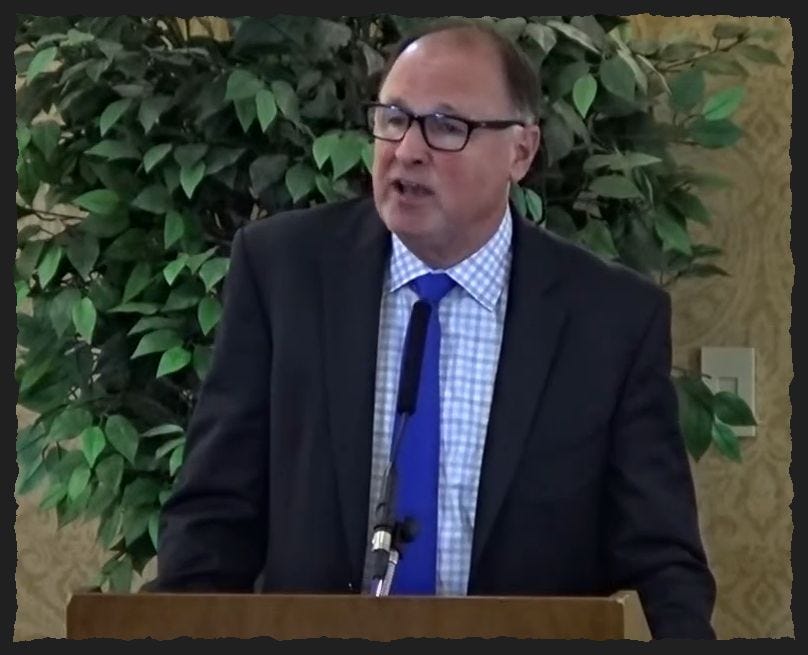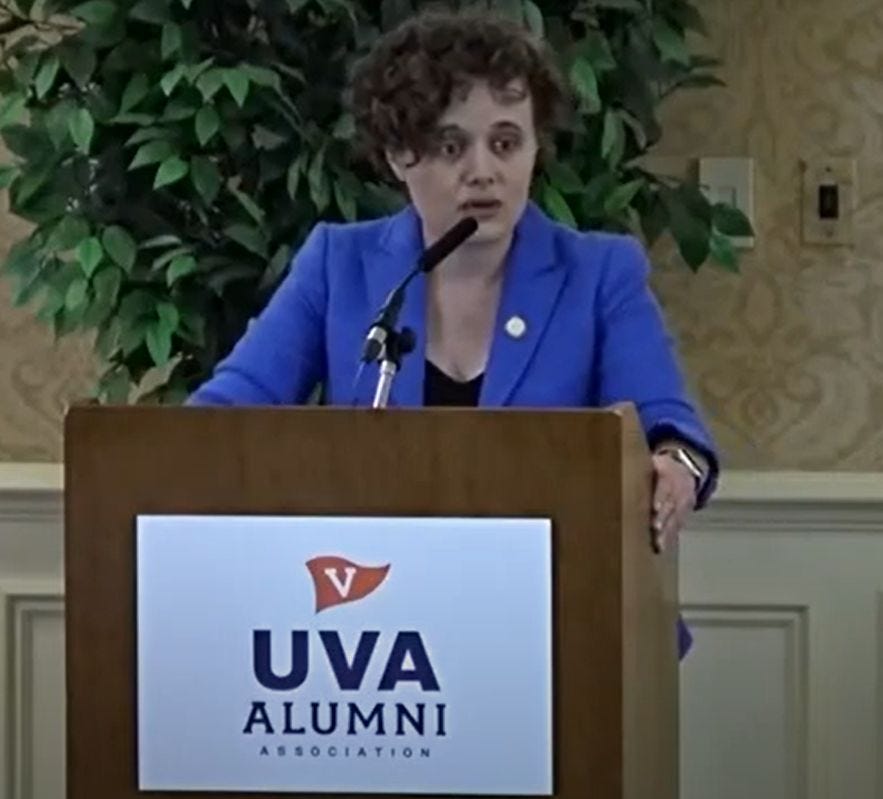Almost no one is wistful that today is the last of the 330’s era of the year 2022. This is Day 339 of a year, and perhaps that is too obscure a way to mark the time, but there could very well be someone who will pine. After all, it is the time to bring that kind of tree into homes. Charlottesville Community Engagement shall aspire to be festive, knowing full well the world moves on despite the merriment and mirth. I’m the cheer resistant Sean Tubbs.
On today’s program:
Fluvanna County to hire a county attorney when the current contract person retires after 37 years
Charlottesville’s draft capital improvement program for FY24 is out and ready for your thorough review
Delegate Sally Hudson and Senator Creigh Deeds appear at a legislative forum at UVA weeks before the General Assembly and months before both will appear on the ballot in a Democratic primary for the new District 11
First shout-out: WTJU Classical Marathon
All year long, WTJU Classical provides Charlottesville with a serene and inspiring musical oasis. The radio station now needs your support to keep this classical community vibrant and thriving!
Please tune in December 5th through 11th for WTJU’s 2022 Classical Marathon — Music Across Time and Place. It’s a round-the-clock celebration of classical music, specially programmed for your listening pleasure.
Each weekday morning announcers will share music of different centuries – starting with 1622 today and working their way up to 2022 on Friday. They are also exploring composers from around the world – Europe, as well as Africa, Latin America, the Himalayan region, and the Arctic. And so much more!
Please consider a gift today to keep WTJU going!
Fluvanna County to create internal city attorney position
For over three and a half decades, Fred Payne has served as the county attorney in Fluvanna on a contract basis. Payne will soon retire and Fluvanna is proceeding in a new direction.
“A decision has been made to move forward with creating a County Attorney Department to have in-house staff assistance as the County continues to grow,” writes County Administrator Eric Dahl in a staff report.
Fluvanna has paid Payne and his law firm Payne & Hodous an average of $292,000 a year between FY18 and FY22, a figure that covers all of the county’s legal needs including work to secure easements to supply water to Zion Crossroads. Legal fees have increased in the current fiscal year to an average of $30,000 a month. That higher figure provides the basis budget for the new department.
“In order to fully cover the County for the range of legal services needed, it is anticipated that the County Attorney Department would be made up of a staff of three: a County Attorney, Assistant County Attorney and Paralegal/Legal Asst,” Dahl continues in the report.
The plan would be to hire the attorney first followed by the other positions. Fluvanna Supervisors will discuss the official job description at their meeting on Wednesday.
Draft Capital Improvement Program available for Charlottesville’s FY24 budget
This afternoon, Charlottesville City Council will hold a budget-related work session, including a report on the budget surplus from FY2022. I’ll have that in future editions of the program as part of ongoing coverage of the development of the next budget.
One of the biggest topics in that conversation will be the need to float a large amount of municipal bonds in order to help finance the reconfiguration of Charlottesville City Schools. The draft five-year Capital Improvement Program is now available for the public to review. (spreadsheet) (fancy viewer)
Before we start, a quick reminder that by state law, Council can only approve funds for the next fiscal year. The additional years in the five-year plan are intended for long-term guidance in paying for future infrastructure needs.
“The capital improvement program is intended to be a multi-year to forecast spending for anticipated capital projects,” Krisy Hammill, the city’s budget and performance director, at a November 22 Planning Commission work session on the CIP. “It’s also supposed to build on the Comprehensive Plan that you all have worked on and it addresses repair and maintenance of existing infrastructure and development of new facilities as well.
For another view of how another locality does this, plan to watch the joint meeting of the Albemarle School Board and Albemarle Supervisors on Wednesday. Learn more in this week’s Week Ahead.
The draft CIP anticipates a total of $99,853,381 in revenues for projects in FY2024. That includes a bond issue of $55,823,907, which is one of the largest in city history. For comparison, the bond sale for the current fiscal year is closer to $17 million. Future years currently anticipate a return to that lower level for bond sales.
Other revenues come from projects that previous City Councils had agreed to fund through bonds but subsequent Councils defunded them. There is $18.25 million from the defunct West Main Streetscape and $5 million for a parking garage on East Market Street.
There are also new sources of revenue listed in the spreadsheet.
There’s an annual transfer of $575,000 from something called “VCF Allocation.” This is a transfer from the Vibrant Community Fund. An earlier version of the newsletter had an incorrect statement and a wrong number.
There’s $1,042,414 from the school system in a line item called “FY22 Gainshare.”
There’s $1,474,519 from the school system in a line item called “Construction Grant Funds”
There’s over $8.6 million from the surplus for FY23 that was placed by Council in a contingency fund for the CIP.
On the revenue side, the largest expense is $72,839,612 for “Charlottesville City School Reconfiguration” which would allow construction at Buford Middle School to begin sometime in 2023. Here’s a description from a very detailed website on the CIP.
“This project will reconfigure the grade distribution of middle-years students in Charlottesville City Schools, moving grades 6, 7 and 8 to a renovated and expanded middle school on the Buford site, moving 5th grade students back to the neighborhood elementary schools,” reads that section of the website.
There’s another $541,060 proposed for a roof replacement at Charlottesville High School. There are similar replacements slated for Burnley-Moran Elementary and Jackson-Via Elementary School in future years.
This will be the first year that major funding from the city for construction of affordable housing is intended to go through a new application process. An application window began in November and closed on November 30. (Charlottesville seeking applicants for housing funds, November 2, 2022)
Alex Ikefuna, the director of the Office of Community Solutions, said nine applications have been received. Yet, as you will see below, the draft capital budget already assumes that Piedmont Housing Alliance and Charlottesville Redevelopment and Housing Authority.
Other items in the capital budget for FY24 include:
$3.7 million for traffic signal infrastructure replacement, with $1 million programmed for the remaining years. This is “for the replacement/upgrade of traffic signal hardware and electronic equipment that is beyond its useful life. Including mast arms, signal heads, electronic controllers, vehicle detection loops, conduit, wiring, uninterruptible power supplies, and switches.”
There is $175,000 programmed to address drainage issues in Oakwood Cemetery that are affecting several graves. “Numerous complaints by family members and many visual inspections have caused the immediate need toward a sustainable solution.”
Parkland acquisition increased to $225,000 from $125,000 for FY24.
The yearly allocation for the Charlottesville Affordable Housing Fund increases to $1.5 million for FY24 and the remaining years.
In FY24, Piedmont Housing Alliance will get $2.21 million for “Friendship Court Infrastructure improvements,” $1.885 million for a project at the MACAA site on Park Street, and $1.125 million for a project at Park Street Christian Church. All of these funds are non-bondable, meaning the city will spend cash rather than finance. I have a question out to the city for when the competitive process for these projects is set to begin.
There is $3 million for redevelopment projects run by Charlottesville Redevelopment and Housing Authority. Unlike PHA’s projects, these can be bonded because a public agency is involved.
Other items for future years include:
$4.217 million in funding for the Stribling Avenue sidewalk that was a requirement for Planning Commission support and Council approval for a rezoning for 170 new units in the Fry’s Spring neighborhood. The draft CIP anticipates the city will receive $2.9 million from Southern Development in FY25. (read previous stories)
There is currently no funding depicted for future school reconfiguration projects from FY25 through FY28. This will be an area to watch during the discussions.
There is no funding slated for economic development strategic initiatives for any of the five years in the CIP.
It’s still relatively early in the conversation. The Planning Commission will have a public hearing on the draft CIP on December 13.
Today’s second shout-out:
In today’s second shout-out, one person who is both a Patreon and Substack subscriber wants you to know that Albemarle County’s Office of Diversity, Equity, & Inclusion is having another quarterly Community Read and Dinner this Thursday night at the Yancey School Community Center in Esmont at 7625 Porter’s Road.
This time around, the book is Esmont Virginia by Andi Cumbo-Floyd. Copies of this history book can be picked up at the two county office buildings and at Little Free Libraries at county parks. The event features a panel discussion and the opportunity to discuss, dine, and hear directly from active community leaders in Esmont. Learn more at engage.albemarle.org.
Deeds and Hudson appear at legislative forum
Creigh Deeds has never faced a primary challenger in the more than 20 years he’s been in the Virginia Senate. Now he is running in the new District 11 but he will have to get more votes than Delegate Sally Hudson in that contest. She is forgoing her current seat to make the challenge.
The two appeared last week at a legislative forum held last week by the University of Virginia. This event was not a debate but offered a glimpse into their different approaches to being a legislator.
Deeds had the opportunity to go first and make some remarks about the upcoming General Assembly Session which begins on January 11. The session came at a time when the UVA community is still mourning the murder of three students.
“We owe it to everybody who has been affected by this tragedy to figure out as much as we can about what happened and why it happened and then see what sort of policy changes can be made, if any, to move us forward and to do a better job of protecting the community, protecting kids, protecting everybody,” Deeds said.
However, Deeds warned that it will be difficult to get any changes in the upcoming session which will only be 46 days long and will be more influenced by Governor Glenn Youngkin.
“The Governor has already announced that he wants $390 million more pumped into tax cuts but recently he said we need to spend more on mental health,” Deeds said. “I can tell you that we really do need to spend more on mental health.”
Deed also said it will also be a very political session with all 140 legislators on the ballot in the first election after redistricting.
Delegate Hudson teaches economics at UVA and said she understands how the community has been affected by the shootings.
“We were just beginning to feel as if we had a semester where the students were somewhat back to normal,” Hudson said. “Students come to the University of Virginia to be pushed. As a teacher, you want school to be the hardest thing going on in your students’ lives. You want them to stay up with a problem all night that they are obsessed with or building the set in the play that they are starring in. Whatever it is you want them to be able to throw themselves at something here and so it has been hard for the last three years to feel as if some of that has been stolen from our students.”
Hudson said gun safety is a priority for her in the upcoming legislative session. She said her service on Health and Finance committees keeps her busy during that time and workforce legislation is a primary interest.
“There are the longer problems in our larger community beyond the University’s boundaries in housing and employment and energy and all of the above,” Hudson said. “Truth be told, it’s entirely too much work to squeeze into six weeks but we do our best.”
The first question came from a man in Greene County named Craig Decker.
“Seems to me that when the Democrats got control of the Assembly finally, they put more effort into putting more effort into a progressive agenda and less into solidifying their gains,” Decker said. “First of all, do you think that’s true, and secondly, if it is somewhat true, what lessons have you learned and what plans do you have going forward?”
Deeds said he felt that sentiment was somewhat correct and told a story about former Virginia Congressman Rick Boucher, a Democrat who held a seat in southwest Virginia for many years before being defeated in 2010.
“Back in 2010 when he was getting ready to lose, he said there were two things that caucus leadership has a responsibility for,” Deeds said. “One is doing good things and two is protecting members of the caucus. So when you focus so much on policy sometimes, you’re not protecting members of your caucus. And the House of Delegates lost a majority last year. I think a longer term view is you have to got figure out how over the long haul you can accomplish good things and that means you have to focus on protecting your caucus.”
Hudson said she felt the most important thing Democrats did while holding a majority in both Houses was to pass legislation to secure the right to vote.
“In the first term, we passed extraordinary legislation to repeal voter suppression tactics that had been on the books for decades,” Hudson said. “We are now a nationwide leader in convenient voting, in same-day registration, in automatic registration, measures which we have seen have great success here among students at the University of Virginia, making it easier for younger people to vote. And most critically what we did was pass a Constitutional amendment that delivered fair maps in the first time in the 400 year history of the General Assembly.”
Watch the entire event on YouTube:
Reading material for this Monday edition
Albemarle Co. Planning Commission recommends denying rezoning request for new development on Old Ivy Road, Dryden Quigley, NBC29, November 29, 2022
Survey finds most support keeping Meriwether Lewis Elementary's name, CBS19, November 29, 2022
Montclair Stream Defenders Notch Victory, Lisa Martin, Crozet Gazette, December 2, 2022
Albemarle County School Board interviews White Hall district seat candidates, Alice Berry, Charlottesville Daily Progress, December 2, 2022
End notes for edition #466
Another edition down, several more to go. This is a busy week with a lot to get to, and I’ll keep this short so I can move on to the next. About 90 percent of my work time is spent reporting as there’s a lot to cover in these last weeks of the year and as a new year beckons.
This is all paid for by subscribers with a little assistance from sponsors like Ting. Ting will match the initial payment for every new subscriber, which I am grateful for. Today I picked up another founding member from someone who knows my work but didn’t know I was back at it! I’m hopeful as more people learn about this work, I’ll be able to hire people to create even more stories about this region of the world we live in.
And even if you don’t pay for a subscription, Ting still wants to be your Internet provider. If you sign up through this link and enter the promo code COMMUNITY, you will unlock:
Free installation
A second month for free
A $75 gift card to the Downtown Mall
Music on the program comes from the Fundamental Grang or Wraki. Original opening music comes from P.J. Sykes.
Any questions? Let me know and I will endeavor to answer!




















Share this post